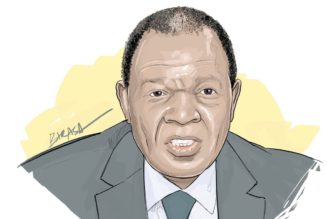Technology
State targets more online content for takedown
Friday January 05 2024

Google logo at the Googleplex in Menlo Park, California. FILE PHOTO | AFP
The Kenya government’s requests to Google to take down content posted by citizens on their various platforms increased more than 10 times in the six months to June 2023, signalling growing internet misuse and an increased surveillance by the State.
Data from the tech giant’s transparency report shows the government requested the company to remove 58 items between January and June last year, up from the five requests in the six months to December 2022, and 6 in the first of the same year.
“This could mean there’s more monitoring of the web by the government itself, or that there has been an increase in the amount of offending content or items that violate certain aspects of the law on the internet,” observed Odanga Madung, a senior researcher at digital rights advocacy organisation Mozilla.
Globally, such requests by governments hit a record high during the same period, with over 60,000 complaints lodged, asking for the removal of some 551,280 items, up from 350,000 the previous period. Russia sent the most requests, followed by South Korea.
According to Mr Madung, the surge could be attributed to a number of seismic events around the globe, including Russia’s war in Ukraine, elections in several countries including the US mid-terms and Kenya, inflation, and skyrocketing cost of living.
“One thing we know is that typically, when there are significant events around the world, platforms tend to be under a lot of scrutiny,” he said.
Google is the most popular search engine in Kenya, used for 98 percent of internet searches in the country, according to data from Irish web traffic analysis firm StatCounter.
Majority of Kenya’s requests were for Google to remove items from appearing in Google searches, while others were to have items removed from YouTube and the company’s blogging platform Blogger.
According to the report, over seventy percent of the requests were initiated by the Judiciary, mostly through court orders directed at Google, and some court orders directed at third parties.
Other requests were made by unnamed government officials, the Executive, the Communications Authority of Kenya, the Competition Authority of Kenya, the police and other minor actors.
Most of the requests were attributed to the content being defamatory or impersonating a duly registered entity. Others were due to copyright infringement and invasion of other people’s privacy.
Elsewhere around the globe, the top reasons for the removal requests were national security concerns, copyright infringement, and personal privacy and security concerns.
But despite the surge in content removal requests, Google did not take any action on over 80 percent of the requests, with only three of the 58 items flagged being successfully removed.
In the region, Kenya remained the leading government in sending such requests. Tanzania requested the removal of 25 items, South Sudan (6 , Uganda (5), Somalia (1) while the other countries did not make any requests.









